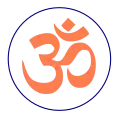Mohā
Mohā (Sanskrit: मोहा), a Sanskrit word, literally means maya or delusion, the concept of ignorance in Hinduism and Buddhism that prevents the realization of truth.[1]
In Yoga philosophy and Hatha Yoga Pradipika, moha is described as a delusion that clouds the mind.[1] It has been cited as one of the causes of perjury.[2] It is one of Shadripur. It is one of the Shadripurs.[3]
Literature
The term is used in theological literature such as the Manusmriti.[4] According to the Vishnu Purana, moha means "foolishness" and represents a form of emotional spiritual pain.[5] Accordingly, "the wise man investigates the three types of worldly suffering, or mental and physical suffering and the like, and attains true knowledge and detachment from human objects, attaining ultimate extinction. According to the Saura Purana, moha refers to one of the five avidyas.[2]
Moha refers to "confounding enemies" and, according to the Kakshaputatantra, represents one of several siddhis.[6] According to the Kubjikamata-tantra, Moh is the third of the eight mothers born from the body of Vahni.[2] These eight sub-manifestations, including delusion, symbolize mental dispositions or emotions and are considered obstacles to the attainment of liberated enlightenment. They were presided over by Unmatt Bhairav.[2]
References
- Moha, Definition - What does Moha mean?, www.yogapedia.com
- Moha, Mohā: 50 definitions, In Hinduism, www.wisdomlib.org
- Shadripu, Ṣaḍripu: 2 definitions, www.wisdomlib.org
- Manusmriti with the Commentary of Medhatithi by Ganganatha Jha, Verse 8.120, quite: लोभात् सहस्रं दण्ड्यस्तु मोहात् पूर्वं तु साहसम् ।
भयाद् द्वौ मध्यमौ दण्डौ मैत्रात् पूर्वं चतुर्गुणम् ॥ १२० ॥ - The Vishnu Purana 6.5.1-6. Horace Hayman Wilson, www.wisdomlib.org
- Kakṣapuṭatantra verse 1.11-13.
